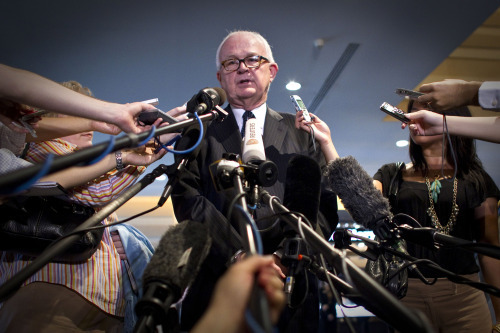Stephen Bosworth, the U.S. special representative for North Korea policy, will meet South Korean officials Monday to discuss ways of resuming the six-party talks aimed at denuclearizing the North and Pyongyang’s recent moves to reactivate its nuclear programs, the Foreign Ministry here said.
Bosworth, who arrived in Seoul on Sunday, will hold talks with South Korea’s chief nuclear negotiator Wi Sung-lac and Foreign Minister Kim Sung-hwan, ministry officials said.
Following the Seoul trip, the U.S. delegation led by Bosworth is scheduled to travel to Tokyo later Monday and Beijing on Tuesday for consultations with their Japanese and Chinese counterparts on North Korean issues.
After his meeting with Bosworth, Wi will fly to Beijing to discuss with his Chinese counterpart Wu Dawei prospects of resuming the stalled multinational denuclearization talks, according to Seoul’s Foreign Ministry.
The flurry of meetings between top envoys from South Korea, the U.S., China and Japan come as concerns are escalating over Pyongyang’s increased activities near its nuclear site.
Faced with deepening food shortages and political instability, North Korea might choose to provoke the world again by conducting a third nuclear test, analysts say. The communist North, which conducted atomic tests in 2006 and 2009, has often used its nuclear ambitions to secure outside assistance of food and fuel.
Bosworth, who arrived in Seoul on Sunday, will hold talks with South Korea’s chief nuclear negotiator Wi Sung-lac and Foreign Minister Kim Sung-hwan, ministry officials said.
Following the Seoul trip, the U.S. delegation led by Bosworth is scheduled to travel to Tokyo later Monday and Beijing on Tuesday for consultations with their Japanese and Chinese counterparts on North Korean issues.
After his meeting with Bosworth, Wi will fly to Beijing to discuss with his Chinese counterpart Wu Dawei prospects of resuming the stalled multinational denuclearization talks, according to Seoul’s Foreign Ministry.
The flurry of meetings between top envoys from South Korea, the U.S., China and Japan come as concerns are escalating over Pyongyang’s increased activities near its nuclear site.
Faced with deepening food shortages and political instability, North Korea might choose to provoke the world again by conducting a third nuclear test, analysts say. The communist North, which conducted atomic tests in 2006 and 2009, has often used its nuclear ambitions to secure outside assistance of food and fuel.

Wi and Wu will exchange views on “a wide range of pending issues” including the conditions of restarting the six-nation denuclearization talks stalled since 2008, Seoul’s Foreign Ministry said.
North Korea, which walked from the talks involving the two Koreas, the U.S., Japan, China and Russia, has been expressing a renewed willingness to rejoin the talks, apparently in need of aid.
While China and Russia are keen to have the talks restart at an early date, South Korea, Japan and the U.S. claim the North must first come clean on attacking a South Korean warship earlier this year and put into action its willingness to disarm.
During his visit to Tokyo last week, Wi agreed with his Japanese counterpart Akitaka Saiki not to rush to open the negotiations until the “right conditions” are created, the Foreign Ministry here said.
North Korea, which is believed to be speeding the power transfer from its ailing dictator Kim Jong-il to his youngest son Jong-un, has resumed construction activities near its main nuclear complex, according to reports.
In a press briefing last week, U.S. State Department spokesman Philip Crowley called the North’s light-water nuclear reactor a potential “danger” to “the region and rest of the world,” rebuffing Pyongyang’s claim that the reactor is being built for peaceful purposes of power generation.
Although less prone to nuclear weapons proliferation, light-water reactors could give North Korea an excuse to enrich uranium to be used for making nuclear warheads.
“North Korea is not pursuing a civilian nuclear program, you know, by itself,” said Crowley. “It is a proliferator. It has a military program. That military program poses a danger, you know, to the region and to the rest of the world.”
Urging the North to play up to its previous commitment to denuclearize, Crowley added his government was willing to provide the country with energy once it gives up its nuclear ambitions.
“If they take affirmative steps to denuclearize, we are prepared to have a conversation about how to meet North Korea’s legitimate energy needs,” he said.
By Shin Hae-in (hayney@heraldcorp.com)









![[Hello India] Hyundai Motor vows to boost 'clean mobility' in India](http://res.heraldm.com/phpwas/restmb_idxmake.php?idx=644&simg=/content/image/2024/04/25/20240425050672_0.jpg&u=)









